Autumn in Kyushu: 20 Fall Foliage Spots in Fukuoka, Oita, and Saga

Fukuoka, Oita, and Saga offer spectacular autumn foliage locations. Discover 20 popular spots for enjoying the fall foliage in northern Kyushu.
Enjoy the Autumn Foliage in Northern Kyushu
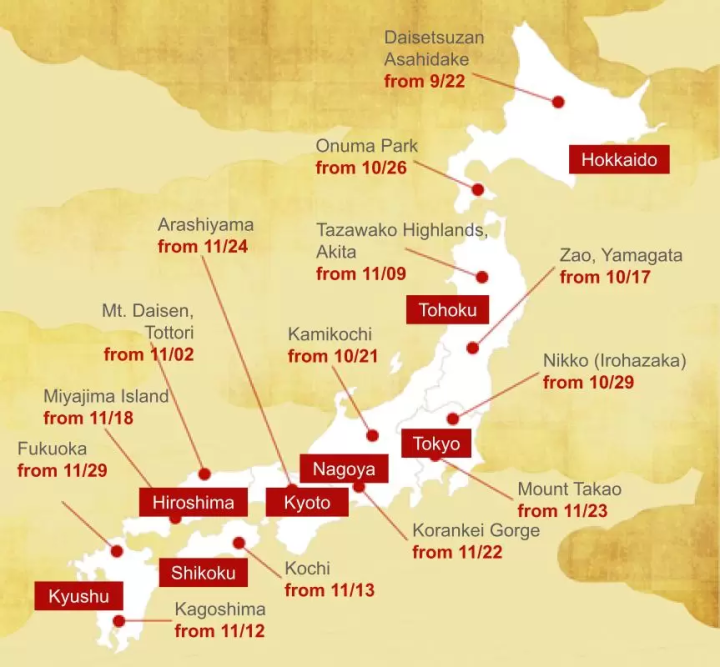
2025 fall foliage map based on information from Weathernews
Fukuoka boasts splendid fall foliage spots but the neighboring Oita and Saga prefectures are also ideal for an autumn leaf-viewing trip.
This article introduces 20 beautiful autumn foliage spots in northern Kyushu.
Please note that the typical period for viewing autumn leaves in northern Kyushu is from early November to late November (with some locations extending into early December).
The Best Autumn Foliage Spots in Northern Kyushu
| Fukuoka | Best Time for Fall Foliage |
| 1. Maizuru Park | Early November to late November |
| 2. Yusentei Park | Mid-November to mid-December |
| 3. Raizan Sennyoji Daihoin Temple | Early November to the end of November |
| 4. Akizuki Castle Ruins | Late November to early December |
| 5. Kamado Shrine | Mid-November to late November |
| 6. Kokura Castle | Early November to late November |
| 7. Mount Hiko | Early November to mid-November |
| 8. Shiranoe Botanical Garden | Late November to early December |
| 9. Komyozenji Temple | Mid-November to late November |
| Saga | Best Time for Fall Foliage |
| 10. Mifuneyama Rakuen | Early November to early December |
| 11. Kunenan Gardens | Mid-November to late November |
| 12. Daikozenji Temple | Mid-November to early December |
| 13. Seikei Park | Mid-November to late November |
| 14. Forest of Environmental Art | Early November to late November |
| Oita | Best Time for Fall Foliage |
| 15. Yabakei Gorge | Mid-November to late November |
| 16. Kyusuikei Valley | Late October to mid-November |
| 17. Lake Kinrin | Early November to mid-November |
| 18. Oka Castle in Taketa | Early November to late November |
| 19. Kuju Mountain Range | Late October to mid-November |
| 20. Futagoji Temple in Kunisaki | Mid-November to late November |
1. Maizuru Park: Easily Accessible from Hakata
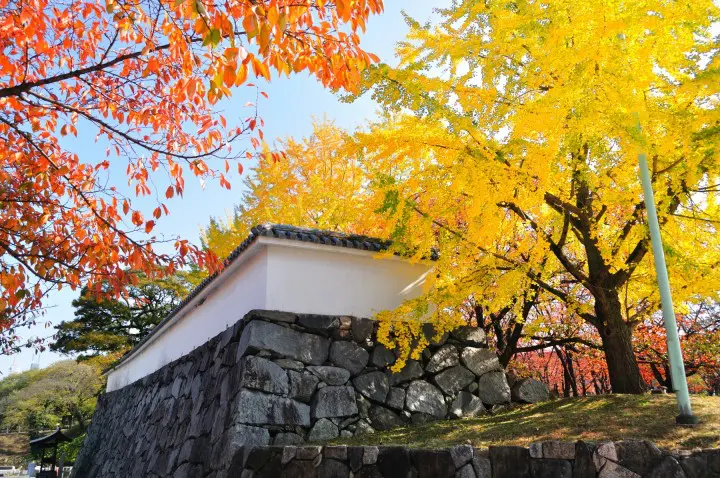
Picture courtesy of Fukuoka City
Maizuru Park is centered around the ruins of Fukuoka Castle. Built during the Edo Period, remnants of the stone walls and arrow towers (*1) still evoke memories of the past. Since opening as a park, it has become a resting place for locals.
While this area is famous for cherry blossom viewing, ginkgo and other trees turn fiery fall hues in autumn, bringing joy to many visitors as a popular spot for foliage viewing.
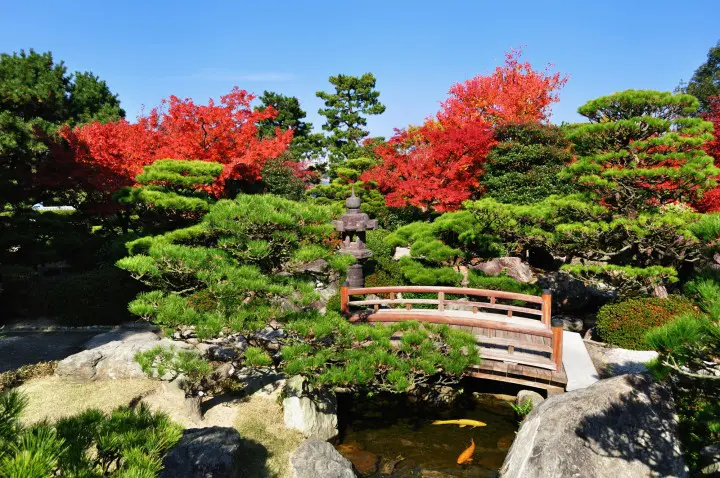
Picture courtesy of Fukuoka City
In the nearby Ohori Park, you can also enjoy autumn leaves in the Japanese garden. Both locations are about a 10-minute subway ride from the center of Fukuoka, specifically Hakata, making them easily accessible spots for viewing the fall foliage.
*1: Yagura: a watchtower or command post built in castles and other locations.
Typical Autumn Foliage Viewing Period
Early November to late November
Address: Maizuru Park, 1 Jonai, Chuo Ward, Fukuoka City, Fukuoka Prefecture
2. Yusentei Park: Showcasing the Harmony of Japanese Gardens
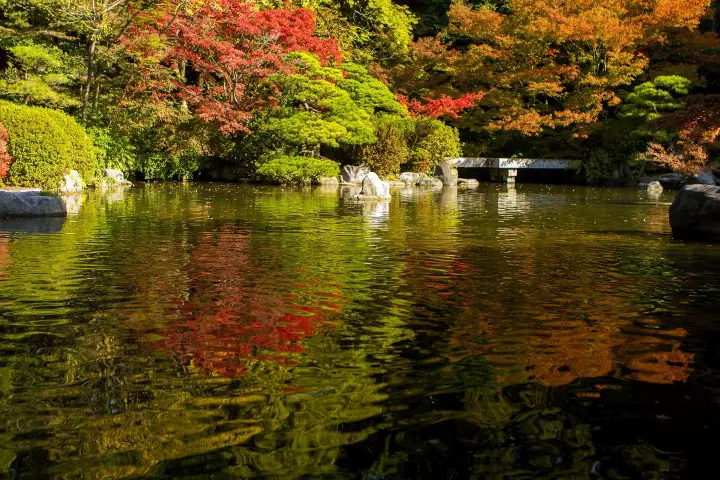
Picture courtesy of Fukuoka City
Yusentei Park was once the villa of the feudal lord (*2) who governed this area and is now a public Japanese garden. The park features a large pond, a tea room, and a cascading waterfall, all embodying the charms of a traditional Japanese garden.
*2: Feudal lord: a lord ruling over a domain during the Edo Period, where the domain was an area overseen by a daimyo.

Picture courtesy of Fukuoka City
From the hall facing the pond, the view of the autumn leaves is simply stunning. The reflection of foliage on the water creates a captivating sense of otherworldliness.
Typical Autumn Foliage Viewing Period
Mid-November to mid-December
Address: 1-46 Yusentei Park, Jonan Ward, Fukuoka City, Fukuoka Prefecture
Official Website: https://yusentei.fukuoka-teien.com/ (Japanese)
3. Raizan Sennyoji Daihioin Temple: Greeting Visitors with a 400-Year-Old Maple Tree
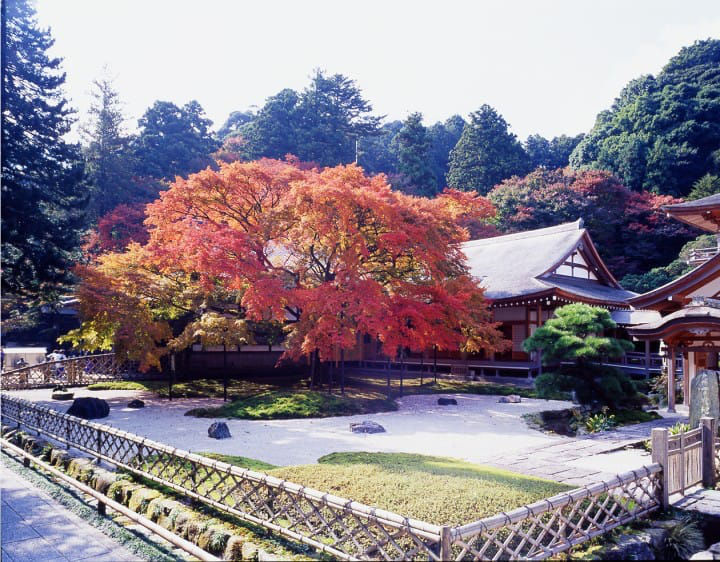
Picture courtesy of Raizan Sennyoji Daihioin Temple
Raizan Sennyoji Daihioin Temple is famous for its designated natural monument, a 400-year-old maple tree. There are also over 200 other maple trees on the premises, making it a popular spot for autumn foliage viewing.
The back garden, or Shinji Garden, features a fragrant sandalwood tree, which can be appreciated alongside the autumn leaves.
From November 1 to 30, admission for leaf viewing is just 100 yen. If you pay a 400 yen entrance fee to access the main hall, you can see important cultural properties designated by the country, including Buddha statues.
Typical Autumn Foliage Viewing Period
Early November to the end of November
Please check the official website (Japanese) of Raizan Sennyoji Daihioin Temple before heading out.
Address: 626 Raizan, Itoshima City, Fukuoka Prefecture
Official Website: https://sennyoji.or.jp/ (Japanese)
4. Akizuki Castle Ruins: Surrounded by Mountains

Picture courtesy of Arakura Tourism Association
Akizuki, also known as the "Little Kyoto of Chikuzen" (*3), is famous for its historical castle town. This basin, located at an elevation of 860 meters and surrounded by mountains on three sides, no longer has remnants of the castle, yet it retains stone walls and gates from the castle period.
One of its highlights, the Akizuki Castle Main Gate, is renowned for its autumn foliage. The contrast between the Main Gate and autumn leaves creates a beautiful scene, attracting many tourists to this picturesque location.
*3: Chikuzen: one of the old names for the Fukuoka region.
Typical Autumn Foliage Viewing Period
Late November to early December
Address: Akizuki Yacho, Asakura City, Fukuoka Prefecture
5. Kamado Shrine: Known for Its Connection to the Red String
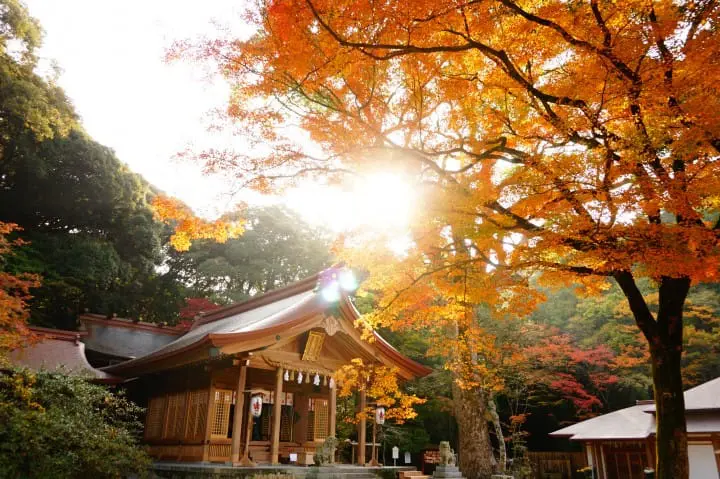
Picture courtesy of Kamado Shrine
Kamado Shrine is a shrine at the foot of Mount Homan, revered as the dwelling place of many deities. Around 300 trees, including ginkgo and maple, turn beautiful colors during the autumn foliage viewing season.
The path to the shrine transforms into a maple tunnel, with layers of vibrant leaves all around. The approach to the shrine, covered in fallen leaves, creates a unique and charming atmosphere.
In addition to leaf viewing, the shrine holds evening illuminations during the season. The timing of the illuminations varies depending on the condition of the leaves, and details for the 2024 leaf festival have yet to be announced. Please refer to the official website (Japanese) for updates.
To visit Kamado Shrine, you can start from Dazaifu Station. It’s also nice to combine the visit with Dazaifu Tenmangu, a representative shrine of Fukuoka.
Typical Autumn Foliage Viewing Period
Mid-November to late November
Address: 883 Ueyama, Dazaifu City, Fukuoka Prefecture
Official Website: https://kamadojinja.or.jp/ (Japanese)
6. Kokura Castle: A Must-Visit for Castle Viewing
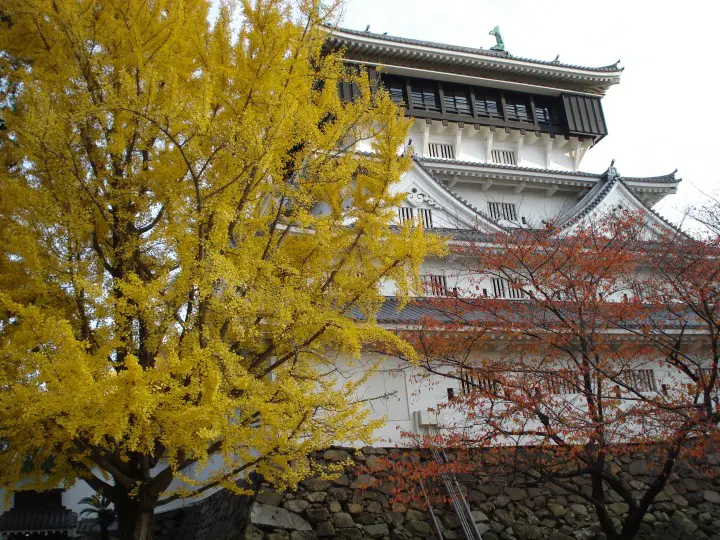
Picture courtesy of Kokura Castle
Kokura Castle is a representative castle of Kitakyushu. Originally built in 1602, the current main keep (*4) is a reconstruction completed in 1959. The five-story structure exhibits significant characteristics of the karazukuri (protruding upper stories) architectural style, making it a beloved castle among visitors.
In spring, it is famous for cherry blossoms, while in autumn, it boasts a splendid display of ginkgo trees.
*4: Main keep: the highest building in a Japanese castle, symbolizing the castle itself.
*As of March 31, 2019, all renovation work on the main keep has been completed, and elevators are available for easier access to floors 1 through 5!
Typical Autumn Foliage Viewing Period
Early November to late November
Address: 2-1 Jonai, Kokurakita Ward, Kitakyushu City, Fukuoka Prefecture
Official Website: https://www.kokura-castle.jp/ (Japanese)
7. Mount Hiko: A Training Ground with Layered Autumn Leaves
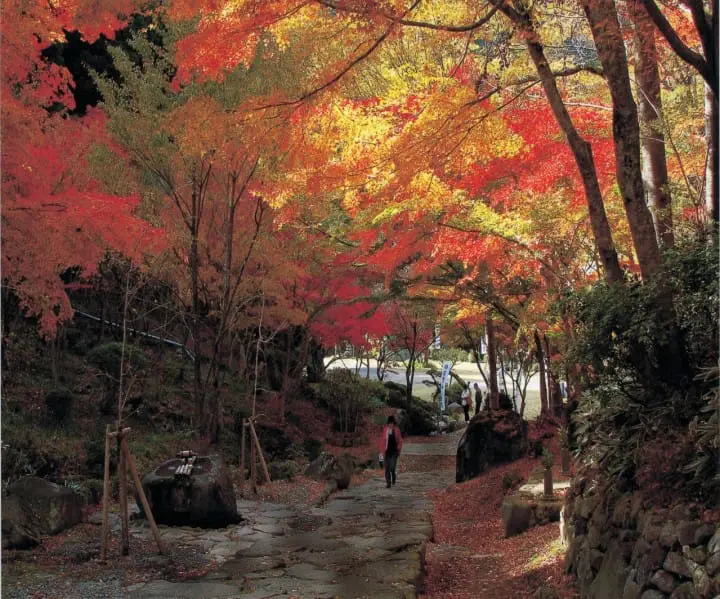
Picture courtesy of Soeda Town Machizukuri Division, Tourism Section
Mount Hiko is the spiritual site of Kyushu's first Shugendo (*5), mountain asceticism. It still retains places where monks practiced austerities in the mountains.
When autumn arrives, the maple and oak trees from the mountain peak to the hillside gradually turn beautiful colors. Walk along the path to Hikosan Shrine, located within Mount Hiko, and enjoy the autumn leaves.
Visitors to Hikosan Shrine can also take the cable car, making it easy for those not comfortable hiking to enjoy Japan's beautiful autumn scenery.
*5: Shugendo: one of Japan's ancient religions aimed at achieving enlightenment through ascetic practices in the mountains, referring to practitioners who train in natural settings.
Typical Autumn Leaf Viewing Period
Early November to Mid-November
Address: Hikosan, Soeda Town, Tagawa District, Fukuoka Prefecture
8. Shiranoe Botanical Garden with Numerous Attractions
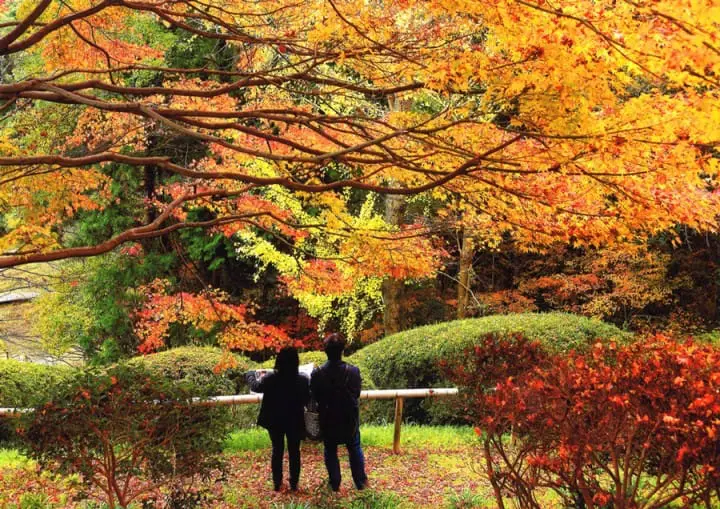
Picture courtesy of Shiranoe Botanical Garden
Shiranoe Botanical Garden is a botanical garden where visitors can appreciate the seasonal changes of various plants. From late November to early December, the entire park is adorned with vibrant red and yellow foliage.
Among the highlights, three specific spots are particularly recommended for viewing the autumn leaves: the Entrance Plaza, Path of Light and Shadow, which features about 800 maple trees, and the Forest of Fallen Leaves, known for the large Japanese maple that was said to have been planted about 50 years ago.
The garden also has a tea room offering seasonal sweets such as oshiruko (red bean soup) and amazake. Please take a moment to relax in this verdant park.
Typical Autumn Leaf Viewing Period
Late November to Early December
Address: 2-chome Shiranoe, Moji Ward, Kitakyushu City, Fukuoka Prefecture
Official Website: https://www.shiranoe.com/ (Japanese)
9. Komyozen-ji Temple: Located near Dazaifu Tenmangu
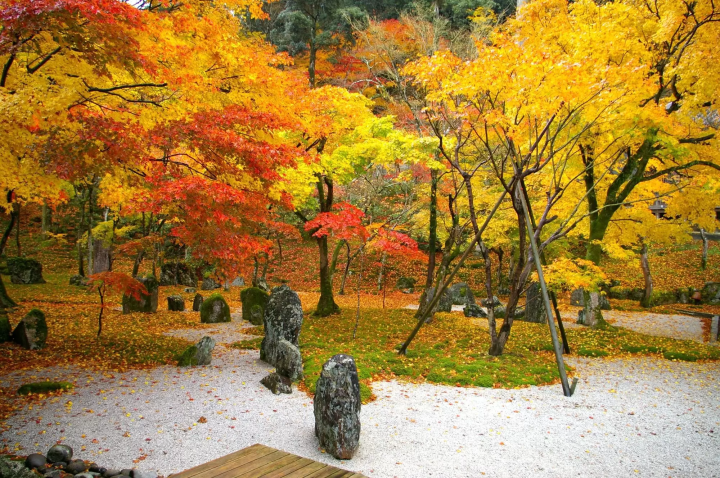
Picture courtesy of PIXTA
Located in Dazaifu, Komyozen-ji Temple was established in the mid-Kamakura period and is famous for its dry landscape garden. Alongside the beautiful landscaping, the garden is adorned with lush green moss. In autumn, the stunning interplay of autumn leaves and the dry landscape garden makes it one of Kyushu's top dry landscape gardens.
Typical Autumn Leaf Viewing Period
Early November to Late November
Address: 2-16-1 Dazaifu, Dazaifu City, Fukuoka Prefecture
10. Mifuneyama Rakuen: Where Culture and Nature Intertwine
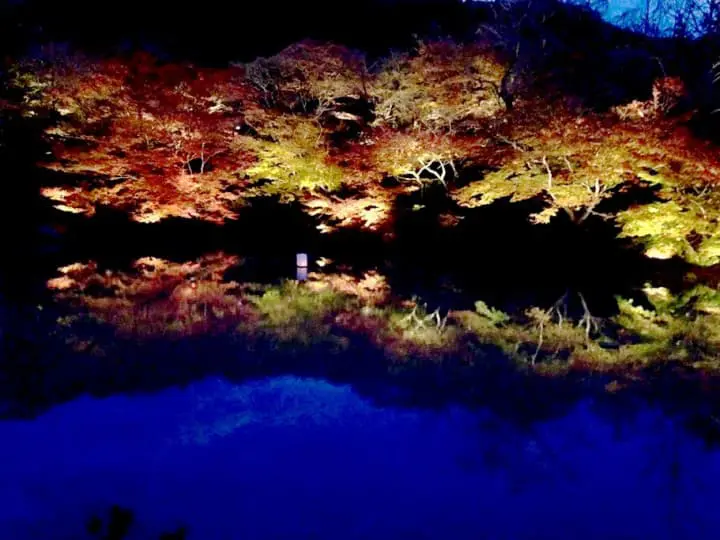
Photo by uniccus
In Saga, Kyushu, Mifuneyama Rakuen offers different sceneries with the changing seasons. During autumn, the expansive garden reflects the vibrant colors of the maple leaves, attracting visitors worldwide. Every November, it hosts a month-long Maple Festival, allowing everyone to leisurely enjoy the autumn beauty of the garden.
Typical Autumn Leaf Viewing Period
Early November to Early December
Mifuneyama Rakuen Maple Festival
Address: 4100 Takeo-cho, Takeo City, Saga Prefecture
Date: November 7 (Thu) - December 8 (Sun), 2024
Morning: 8:00 AM - 5:30 PM, Evening: 5:30 PM - 10:00 PM (Event will proceed in rainy weather)
Official Website: https://www.mifuneyamarakuen.jp/autumn/ (Japanese)
11. Kunenan Gardens: Maple Leaves Contrasting against Green Moss
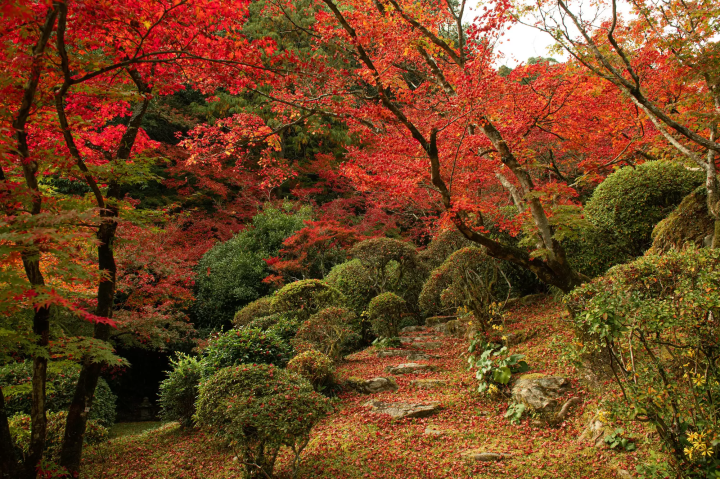
Picture courtesy of PIXTA
Kunenan Gardens is a famous garden created by the notable Saga entrepreneur Itami Yataro during the Meiji Period, taking nine years to build.
The garden offers stunning views of Mount Unzen and the Chikuzen Plains. It has even been designated as a national scenic spot. In autumn, the deep crimson leaves contrast vividly with the lush green moss throughout the garden, creating a breathtaking spectacle.
Kunenan Gardens is not generally open to the public but is accessible only from November 15 to 23 each year, allowing the public to marvel at this autumn beauty. If you are in Saga during this period, don’t miss this once-a-year opportunity to visit! If your schedule doesn’t align with these days, enjoying the autumn foliage in the surrounding area is still recommended. Next to Kunenan Gardens is Nibiyama Shrine, famous for its abundant maple trees and a renowned autumn leaf viewing spot in Kyushu!
Typical Autumn Leaf Viewing Period
Mid-November to Late November
Public Viewing Period: November 15 to 23
Address: 1696 Kanzaki-cho, Kanzaki City, Saga Prefecture
12. Daikozen-ji Temple: Where Autumn Colors Sweep across the Mountains
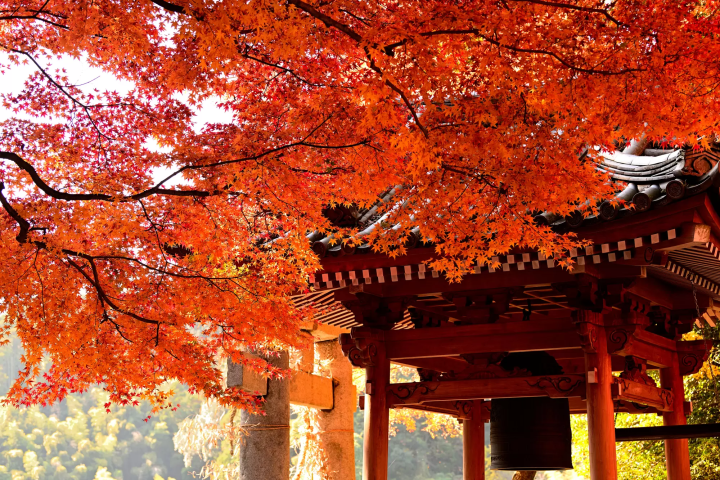
Picture courtesy of PIXTA
Founded in the 8th century, Daikozen-ji Temple enshrines a secret Buddha, a statue of the Eleven-Headed Kannon. The main hall, built with thatched grass, has been standing for 400 years and offers a sense of tranquility amid the bustling autumn foliage.
The Keien garden on the slopes of Mount Kei is designed with varying elevations, showcasing different landscapes. Particularly in autumn, the leaves' colors change beautifully with the terrain and light.
Typical Autumn Leaf Viewing Period
Mid-November to Early December
Address: 3628 Sonobe, Kiyama Town, Miyaki District, Saga Prefecture
Official Website: https://daikouzenji.com/ (Japanese)
13. Seikei Park: Awash in Vibrant Red Foliage
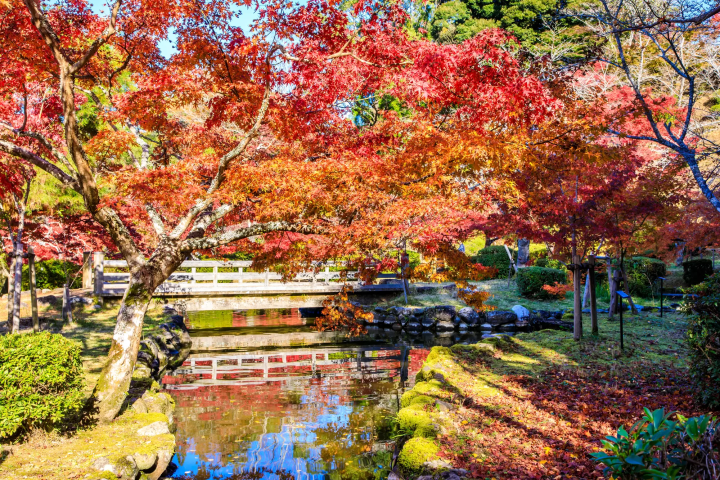
Picture courtesy of PIXTA
The local coal magnate, Takatori Iyoshige, meticulously arranged this garden, which has been donated to the local government. It now forms part of the expansive Seikei Park, including the nationally designated cultural property Kanotei and a local history and folklore museum.
The park is home to 180 maple trees, and every autumn, the deep red leaves transform the park into a vibrant spectacle. The reflections in the park's ponds enhance the lively scene even further!
Typical Autumn Leaf Viewing Period
Mid-November to Late November
Address: 1975-1 Takaku-machi, Taku City, Saga Prefecture
Official Website: http://www.nishikyushu.com/seikei_park/ (Japanese)
14. Forest of Environmental Art: Recreating the Beauty of Rurikoin Temple

Picture courtesy of Saga Prefectural Tourism Federation
The Forest of Environmental Art is located at the foot of Mount Rai in Saga and took 30 years to complete as a forest environment. Each autumn, it becomes a canvas for nature's creative expression.
The forest is home to approximately 10,000 maple trees. Come autumn, the entire park bursts into fiery red, creating a breathtaking sight. In addition to its rich natural beauty, visitors can enjoy stunning reflections of autumn leaves similar to those seen at Rurikoin Temple in Kyoto.
Typical Autumn Leaf Viewing Period
Early November to Late November
Address: 667 Hirano, Geike-machi, Karatsu City, Saga Prefecture
Official Website: https://morisaga.com/ (Japanese)
15. Yabakei Gorge: Where Rocky Peaks and Maple Leaves Are Viewable Together

Illumination at the Stream Rock Garden Photo by Pixta
Yabakei is one of Kyushu's most iconic spots for autumn foliage. The textured rocks are covered with a mix of red and yellow leaves from maple and ginkgo trees, stretching throughout the valley.
The various uniquely shaped rock formations create a dynamic landscape showcasing nature's astounding artistry.
Typical Autumn Leaf Viewing Period
Mid-November to Late November
Address: Fukuyama, Yabakei-cho, Nakatsu City, Oita Prefecture
16. Kyusuikei Valley: Blanketed with Maple Leaves
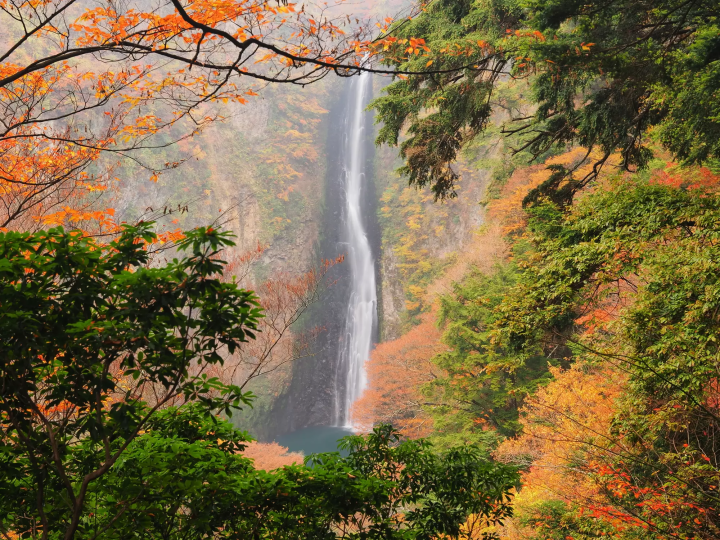
Picture courtesy of PIXTA
Kusu River offers stunning scenery that takes your breath away from the moment you step out of your car. That's because the mountains around Tengu Falls are adorned with autumn foliage from the parking lot.
Kyusuikei is a 2-kilometer-long valley along the Kusu River, also known for its "Jusankyo" or "Thirteen Curves." Each season presents different beautiful landscapes, with the fresh greenery of early summer and the vibrant red leaves of autumn being the most renowned.
While traversing various suspension bridges, you can occasionally look down into the valley or gaze at the sheer cliffs. The amazing views of waterfalls accompanied by autumn leaves provide a soothing experience for hikers.
Typical Autumn Leaf Viewing Period
Late October to Mid-November
Address: Tano, Kuju Town, Kuju District, Oita Prefecture
17. Kinrin Lake, Reflecting Breathtaking Scenery
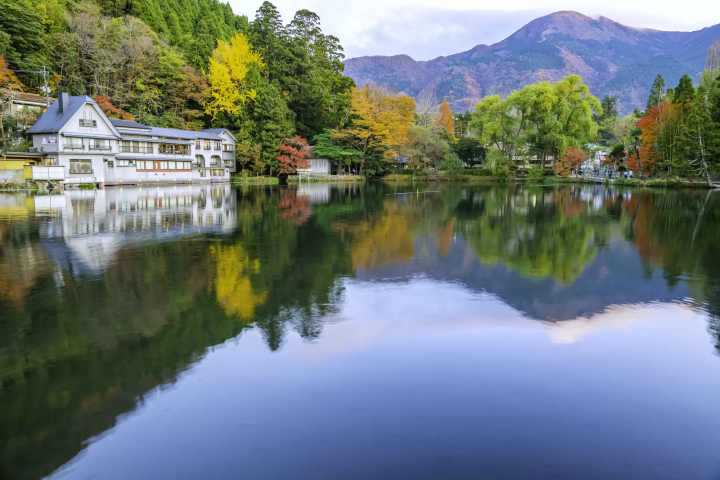
Picture courtesy of PIXTA
Kinrin Lake is a famous sightseeing spot in Yufuin. In autumn, the colorful foliage transforms the lakeside into a vibrant display, extending its beauty to the reflections on the water and captivating all who visit.
If you are fortunate enough to encounter swirling mist over the lake, it adds to the magical atmosphere, making for a truly unique experience!
Typical Autumn Leaf Viewing Period
Early November to Mid-November
Address: Kinrin Lake, Kawakami, Yufuin Town, Yufu City, Oita Prefecture
18. Takeda Castle Ruins: Showcasing Autumn in a Ruined Castle
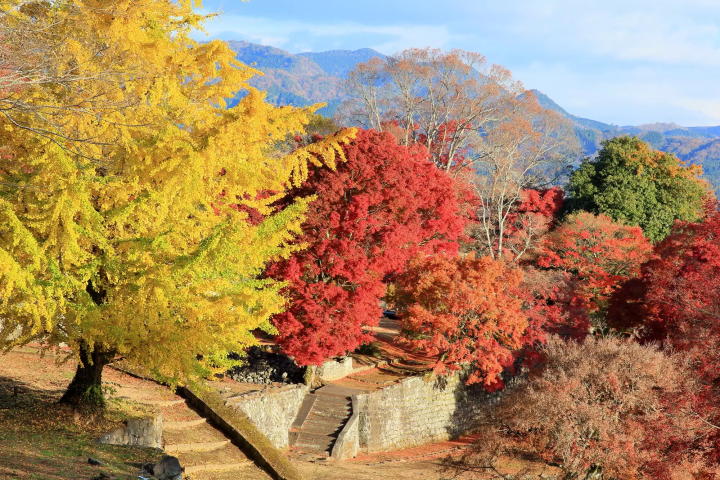
Picture courtesy of PIXTA
Located in Takeda, Oita, Takeda Castle Ruins are said to be the castle featured in the famous Japanese song "Kojo no Tsuki" (Moon Over the Ruined Castle). This ancient fortress was built along a sheer cliff rising 3,255 meters high.
However, only the stone walls remain today. Each autumn, the site is adorned with the vibrant colors of 2,500 maple trees, attracting many visitors. The autumn scenery at this once-grand castle is anything but desolate.
Typical Autumn Leaf Viewing Period
Early November to Late November
Address: 320 Takeda, Takeda City, Oita Prefecture
Official Website: https://okajou.jp/en/
19. Kuju Mountain Range: Showcasing Magnificent and Continuous Autumn Foliage
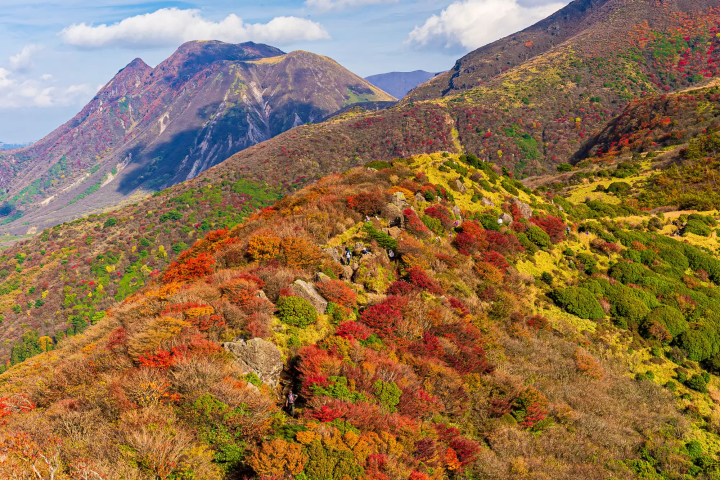
Picture courtesy of PIXTA
Aso-Kuju National Park spans both Kumamoto and Oita prefectures. It is also known for its mountain range, often called the "Rooftop of Kyushu," with peaks reaching 1,700 meters. No wonder it's one of the popular tourist destinations in Kyushu.
In autumn, the vibrant reds and yellows of maple and ginkgo trees decorate the rugged mountain ridges, while the golden reeds in the Kuju Highland below add to the spectacular and rare autumn scenery.
Typical Autumn Leaf Viewing Period
Late October to Mid-November
Address: Kusu Town, Takeda City, Oita Prefecture
20. Futagoji Temple in Kunisaki: A Sacred Ambiance
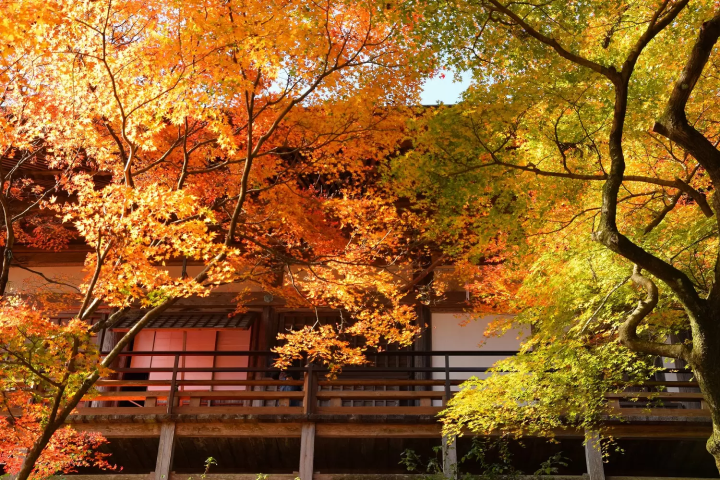
Photo by PIXTA
Futagoji Temple is one of the best places to enjoy the fall colors in Kunisaki, an area in Oita famous for its magnificent nature and outdoor art installations.
The precincts of the temple are extensive and dotted with several structures that boast a rich history. Visit this place in autumn and you'll be struck by the tranquility of the environment, filled only by the sounds of the mountain.
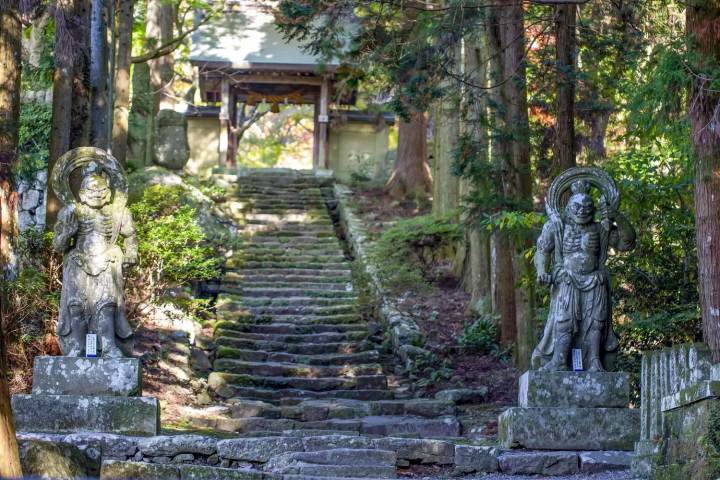
Photo by PIXTA
The entrance to Futagoji is guarded by two impressive Nio statues that give the precincts a dignified air. The approach to the temple is lined with maple trees that form a colorful corridor in late November.
Typical Autumn Leaf Viewing Period
Mid-November to late November
Address: Oita, Kunisaki City, Aki, Futago 1548
Enjoy Autumn in Kyushu
Kitakyushu boasts many stunning autumn leaf viewing spots that harmoniously blend with nature. If you visit Kyushu in the fall, take this opportunity to fully enjoy the breathtaking scenery!
This is the official account of MATCHA's English editorial team. We are bringing you the latest travel information on Japan.






































![[Niigata] Skiing and snowboarding are just not enough! Fun snow spots for parents and children](https://resources.matcha-jp.com/resize/720x2000/2026/01/29-256901.webp)
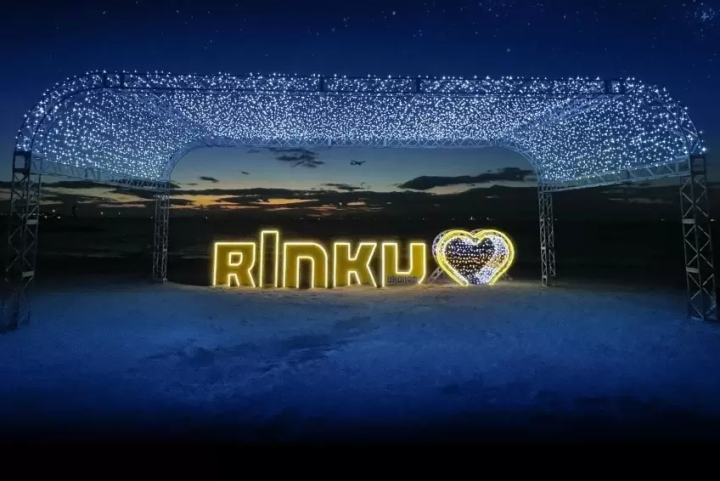
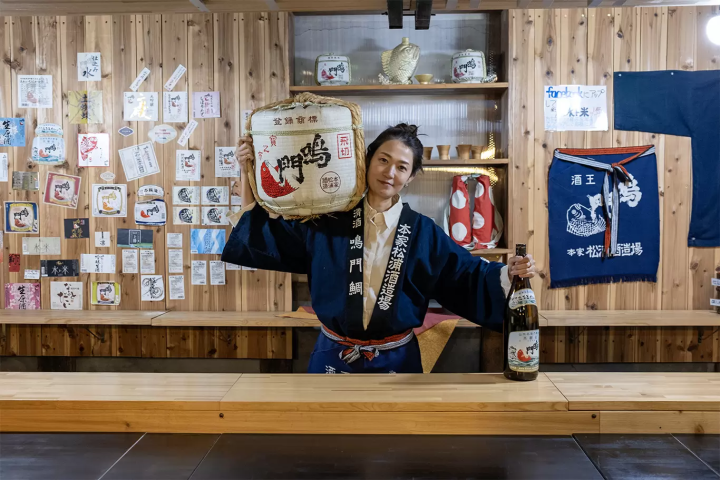
![[Gunma, Nakanojo] Experience Japanese history in a wooden school building from the Meiji era](https://resources.matcha-jp.com/resize/720x2000/2025/12/25-254022.webp)
